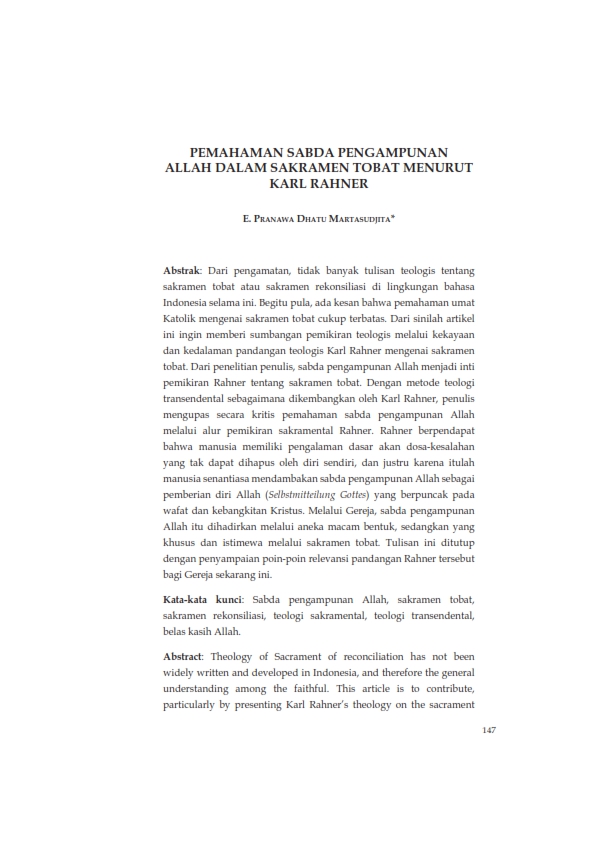Pemahaman Sabda Pengampunan Allah Dalam Sakramen Tobat Menurut Karl Rahner
Abstract
Abstrak: Dari pengamatan, tidak banyak tulisan teologis tentang sakramen tobat atau sakramen rekonsiliasi di lingkungan bahasa Indonesia selama ini. Begitu pula, ada kesan bahwa pemahaman umat Katolik mengenai sakramen tobat cukup terbatas. Dari sinilah artikel ini ingin memberi sumbangan pemikiran teologis melalui kekayaan dan kedalaman pandangan teologis Karl Rahner mengenai sakramen tobat. Dari penelitian penulis, sabda pengampunan Allah menjadi inti pemikiran Rahner tentang sakramen tobat. Dengan metode teologi transendental sebagaimana dikembangkan oleh Karl Rahner, penulis mengupas secara kritis pemahaman sabda pengampunan Allah melalui alur pemikiran sakramental Rahner. Rahner berpendapat bahwa manusia memiliki pengalaman dasar akan dosa-kesalahan yang tak dapat dihapus oleh diri sendiri, dan justru karena itulah manusia senantiasa mendambakan sabda pengampunan Allah sebagai pemberian diri Allah (Selbstmitteilung Gottes) yang berpuncak pada wafat dan kebangkitan Kristus. Melalui Gereja, sabda pengampunan Allah itu dihadirkan melalui aneka macam bentuk, sedangkan yang khusus dan istimewa melalui sakramen tobat. Tulisan ini ditutup dengan penyampaian poin-poin relevansi pandangan Rahner tersebut bagi Gereja sekarang ini.
Kata-kata kunci: Sabda pengampunan Allah, sakramen tobat, sakramen rekonsiliasi, teologi sakramental, teologi transendental, belas kasih Allah.
Abstract: Theology of Sacrament of reconciliation has not been widely written and developed in Indonesia, and therefore the general understanding among the faithful. This article is to contribute, particularly by presenting Karl Rahner’s theology on the sacrament of reconciliation. Rahner focused on the forgiving word of God. Employing his transcendental method, this article is presenting a critical study on the understanding of Rahner’s forgiving word of God as well as his sacramental theology. Rahner showed that human beings themselves aware and know of their experience of sin or guilt and could not just get out of it, and because of that human beings themselves are longing for forgiveness and God’s forgiving word (Selbstmitteilung Gottes) revealed per exellentiam in the death and resurrection of Christ. Disciples of Christ gathered as people of God or church make present God’s forgiving word here and now in various forms, yet especially in the sacrament of reconciliation. The article shall conclude with points of relevance for the church today.
Keywords: God’s forgiving word, sacrament of penance, sacrament of reconciliation, sacramental theology, transcendental theology, mercy of God.

DISKURSUS applies the Creative Commons license (CC BY). We allow readers to read, download, copy, distribute, print, search, or link to the full texts of its articles and allow readers to use them for any other lawful purpose. Full information about CC BY can be found here: https://creativecommons.org/licenses/by/4.0/












